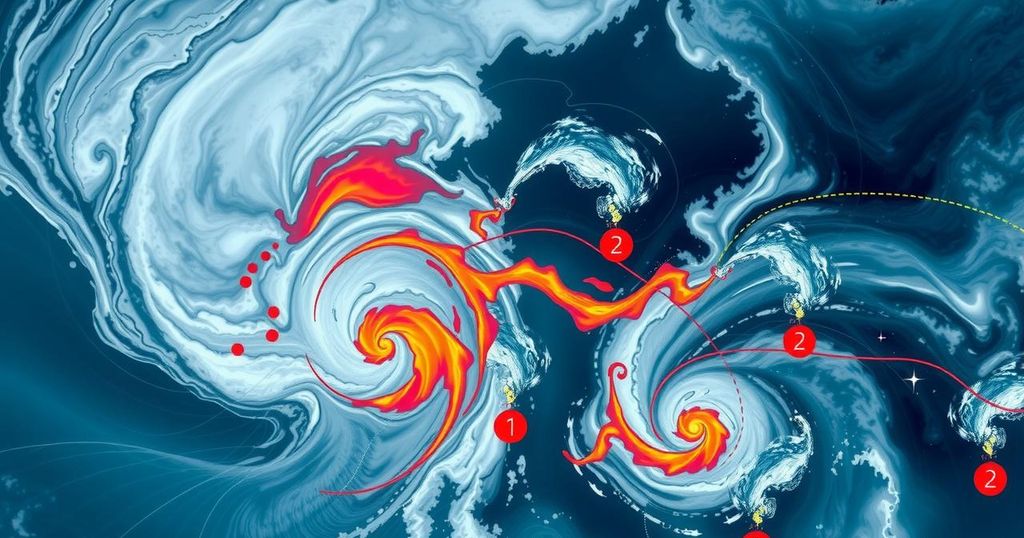Cyclone Chido: The Impact of Climate Change, Migration, and Conflict on Tropical Storms
Cyclone Chido emerged as an intense tropical cyclone equivalent to a category 4 hurricane, impacting Mayotte and Mozambique in December 2023. Contributing factors include rising ocean temperatures due to climate change and socio-economic vulnerabilities exacerbated by conflict and migration. An estimated 70% of Mayotte’s population was affected, while extensive destruction occurred in Mozambique, highlighting the urgent need to address the complexities of climate change, conflict, and displacement in the region.
Cyclone Chido, characterized as an intense tropical cyclone, reached catastrophic proportions comparable to a category 4 hurricane in December 2023. Upon landfall in Mayotte, the storm produced wind gusts nearing 155 mph (250 km/h) and subsequently struck Mozambique with equal severity. This cyclone exemplifies the increasing trend of intense tropical storms in the Indian Ocean region, attributed mainly to rising ocean temperatures due to climate change. News reports indicate severe fallout from Chido, affecting approximately 70% of Mayotte’s population and leading to extensive destruction of homes in Mozambique, with rising infrastructural and humanitarian challenges due to ongoing conflict and migration in these areas.
Strategic evaluations of the changing characteristics of tropical cyclones across southern Africa are pivotal in understanding their intensified impacts. The ongoing conflict in Mozambique, along with the precarious situations faced by undocumented migrants in Mayotte, has exacerbated the devastation caused by Cyclone Chido. Many migrants, fleeing violence from places like the Democratic Republic of Congo, now represent a significant portion of Mayotte’s population. Inadequate housing conditions and fear of police intervention during evacuations have worsened the crisis.
The situation in Mozambique is dire, as conflict and recurrent cyclones have displaced many, leaving a substantial population in temporary camps. After Cyclone Chido, it is projected that the number of displaced individuals will significantly increase. The timing of Chido’s emergence during the cyclone season hindered the preparation and distribution of humanitarian aid, further compounding the crisis.
Climate change plays a critical role in the intensification of tropical cyclones, with predictions indicating that the Indian Ocean may experience even more severe storms. Research on Cyclone Chido has revealed that sea surface temperatures were significantly warmer due to climate change, thereby increasing the cyclone’s wind speed and intensity. Additionally, the potential for more rainfall and slower-moving storms, along with rising sea levels, amplifies the risk of flooding.
In light of these findings, it is clear that addressing the complexities of conflict, migration, and social dynamics is essential for enhancing resilience to future cyclones. Without considering these factors, vulnerable communities will continue to be disproportionately affected by climate change’s ramifications.
The recent frequency and intensity of tropical cyclones have raised significant concerns, particularly in the Indian Ocean region. Increasing ocean temperatures, largely as a result of climate change, are correlating with the emergence of more powerful storms. This is evident in the devastation wrought by Cyclone Chido, emphasizing the intersection of climatic events with socio-economic factors such as migration and conflict. Moreover, the challenges faced by vulnerable populations residing in poorly constructed housing under dire conditions necessitate a re-evaluation of humanitarian preparedness and mitigation strategies. The area affected includes Mayotte and Mozambique, both experiencing unique challenges exacerbated by migration patterns and ongoing conflicts. Understanding the evolving dynamics of cyclones and their socio-political impacts is crucial to developing comprehensive strategies to combat these natural disasters in a warming world.
In conclusion, Cyclone Chido represents a stark illustration of the growing threat posed by intensified tropical storms in a changing climate. The combination of rising sea temperatures, socio-economic vulnerabilities, migration pressures, and ongoing conflict creates a multifaceted challenge for affected populations. Addressing these interconnected issues is essential for improving resilience and effectiveness in disaster response and recovery strategies moving forward.
Original Source: theconversation.com




Post Comment